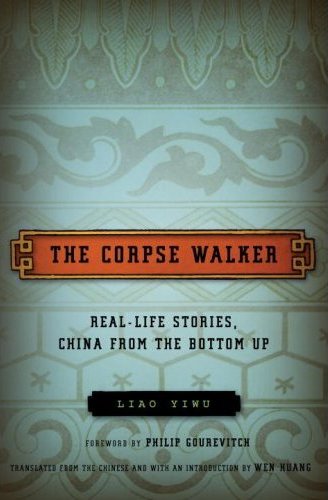
The Corpse Walker: Real Life Stories: China from the Bottom Up
by Liao Yiwu
Thanks to Liao Yiwu, “yo ho, yo ho” will never sound the same.
In The Corpse Walker, the innocuous chant – best known to Americans for its use in Disneyland’s Pirates of the Caribbean attraction – is also the refrain (as translated) of Chinese men assigned to a particularly grim task: transporting the dead, sans coffins, to their burial places, often over vast distances and tough terrain.
These corpse walkers are among the many people from the bottom rung of Chinese society interviewed in Liao’s book, which stands as a testament to his tenacity in seeking out rare characters and in surviving government persecution for his work. Each of Liao’s 27 subjects – including a professional mourner, a migrant laborer, a human trafficker, a leper, a former Red Guard member – could fill his or her own book. They have big and brutal stories to tell of surviving famine, poverty, and persecution. And Liao’s decidedly non-journalistic interviewing style – contentious and chastising, curt and open-ended – gives their stories, rather than his style, the stage.
Liao, as Philip Gourevitch and translator Wen Huang write in their respective introductions, has an intimate connection with his subjects. Like them, he suffered severely under Mao Tse-Tung: as a child, he nearly died of starvation; his father was labeled a state enemy; and as an adult, he was put in jail and tortured for his poetry. When he was released, he found his wife and child had left him, and his city residence permit had been canceled. His only employment, beyond the writing he continued to pursue in secret, was as a street musician.
Nearly every person interviewed is affected as profoundly by China’s Communist government, particularly the Cultural Revolution and the Great Leap Forward. A monk describes seeing his temple and its priceless relics destroyed, and enduring beatings that left him unable to raise his arm. A composer discusses being captured and beaten for a stray remark about communism, and being forced to denounce his fellow musicians as traitors. One woman recalls seeing her brother and husband lying dead next to each other after their public execution: “Under the bright sunshine, their faces looked calm, as if they were whispering to each other.”
Liao’s interviews are full of stunning statements like this – darkly beautiful or frighteningly blunt words from non-writers who have seen, accepted or even participated in horrors most in the U.S. can’t imagine. A hungry and homeless “feng shui master,” for instance, brags of catching bugs with his teeth for food as he sleeps in his future tomb. A mortician mentions making up the faces of the violently murdered, comparing it to “washing a toilet bowl.” A manager of a public restroom, when questioned about the fetuses he has found in toilets, “In China, life is cheap.” A blind street musician, when asked whether he is wasting his life playing in front of restaurants, says, “My life? I have never pondered these profound issues.” And when Liao says to a former Red Guard member that he seems to have gotten a high from beating people, the man, rather than denying or repenting it, simply says, “Oh yes.”
There are also a few interviews with younger people, still persecuted, whether as a part of the Falun Gong or relatives of those who died in the Tiananmen Square massacre. There are those, too, who are simply struggling in today’s China to make a buck. They give the pervasive suffering of Liao’s subjects – their casual intimacy with death, their humility about life – a sad universality.
Excerpt: From an interview with Feng Zhongci, labeled a Rightist by the Communist Party, “Between the Party and a woman, I picked the latter. People need to put their personal life first, don’t you think, young man? We joined the Communist revolution so we could live a better life, have enough to eat, marry a beautiful woman, and raise a family. This basic concept was totally distorted in the Mao era. All we talked about where the abstract ideas such as the Party and the People. Private lives were considered something disgraceful…. We really should thank Deng Xiaoping for ending the era when humans lived like ghosts, devoid of any feelings or emotions.”
Further Reading: Oracle Bones: A Journey Through Time in China and Working: People Talk About What They Do All Day and How They Feel About What They Do




Send A Letter To the Editors